Charles E W Bean, Diaries, AWM38 3DRL 606/249/1 - 1917 - 1932 - Part 2
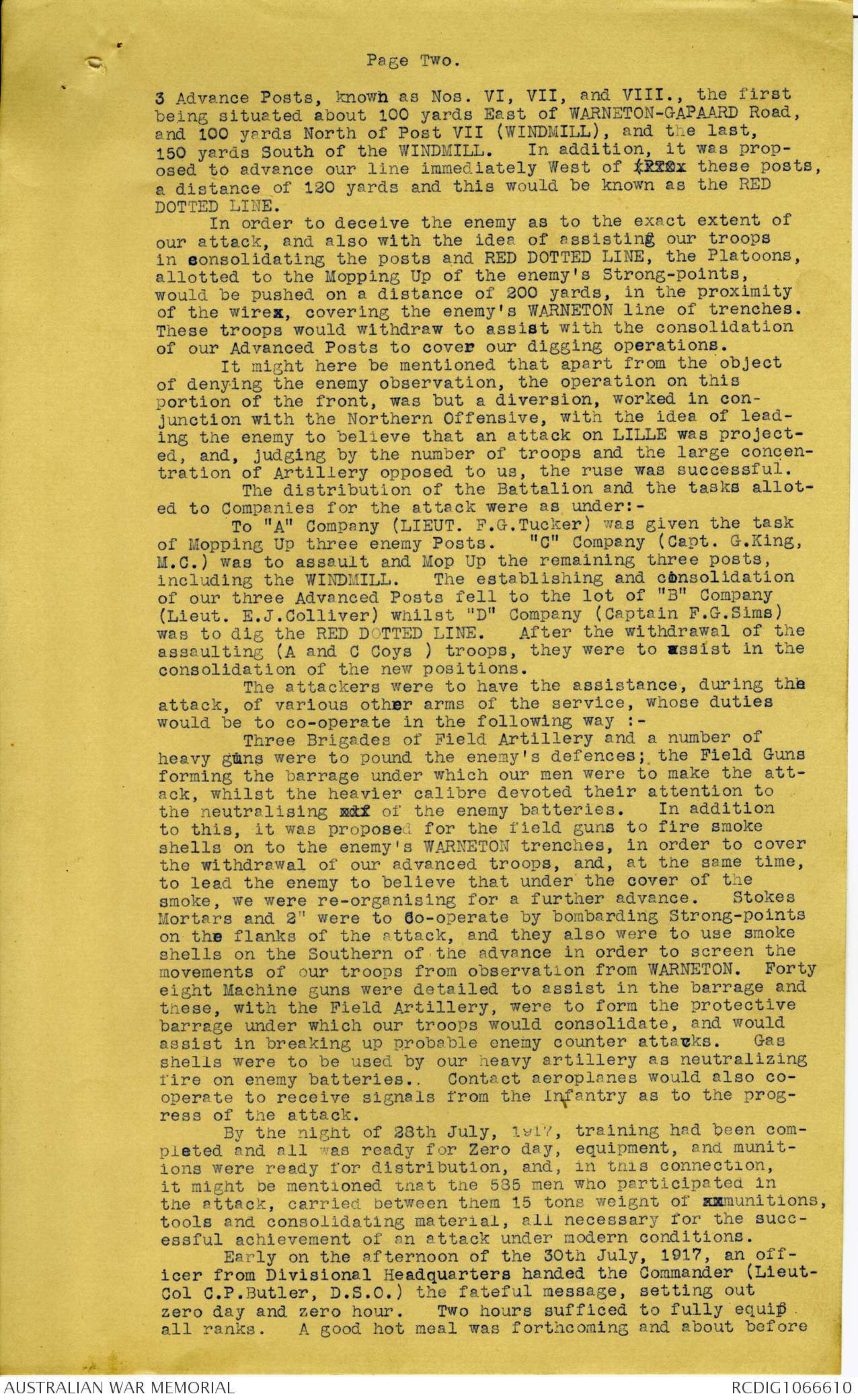
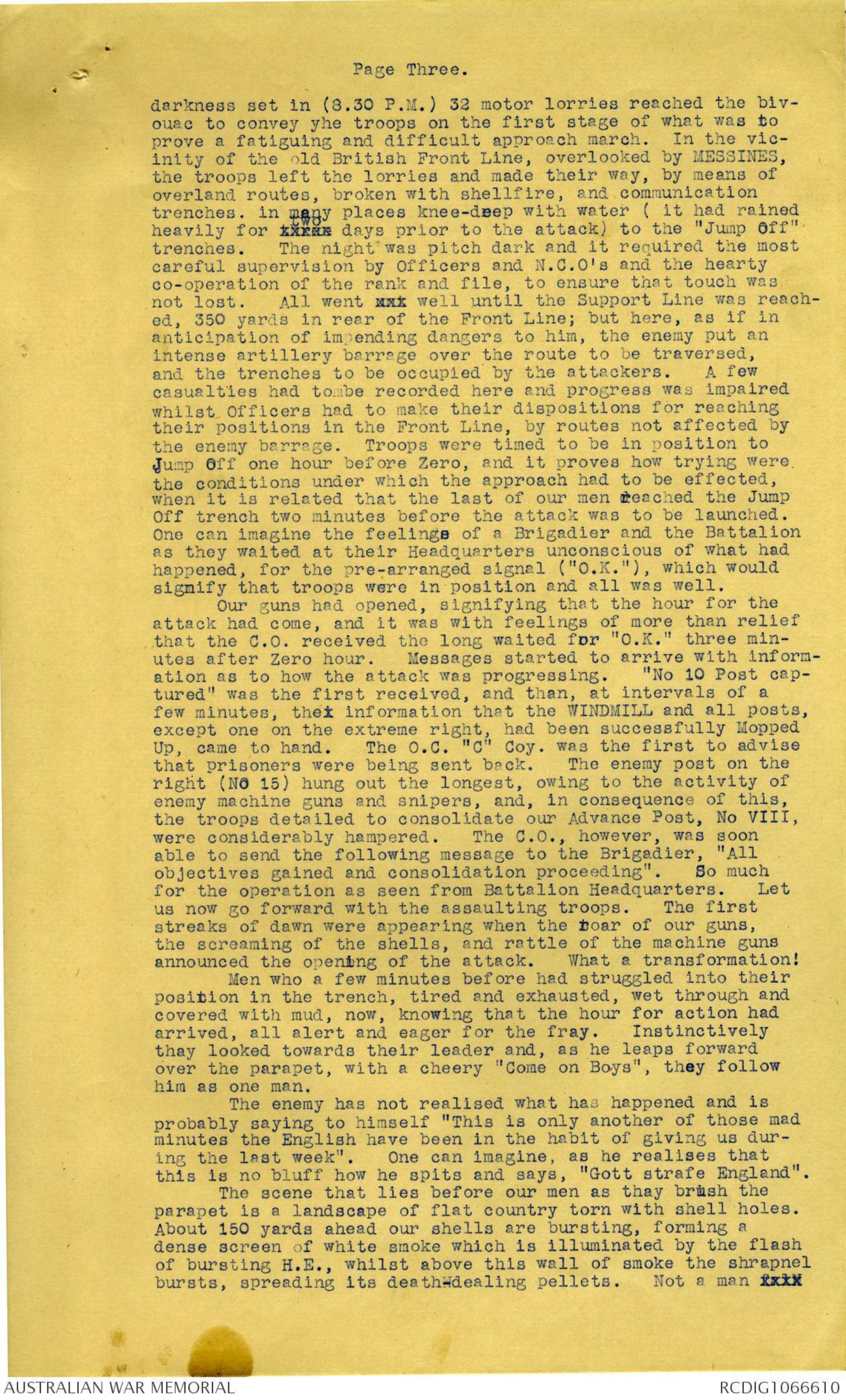
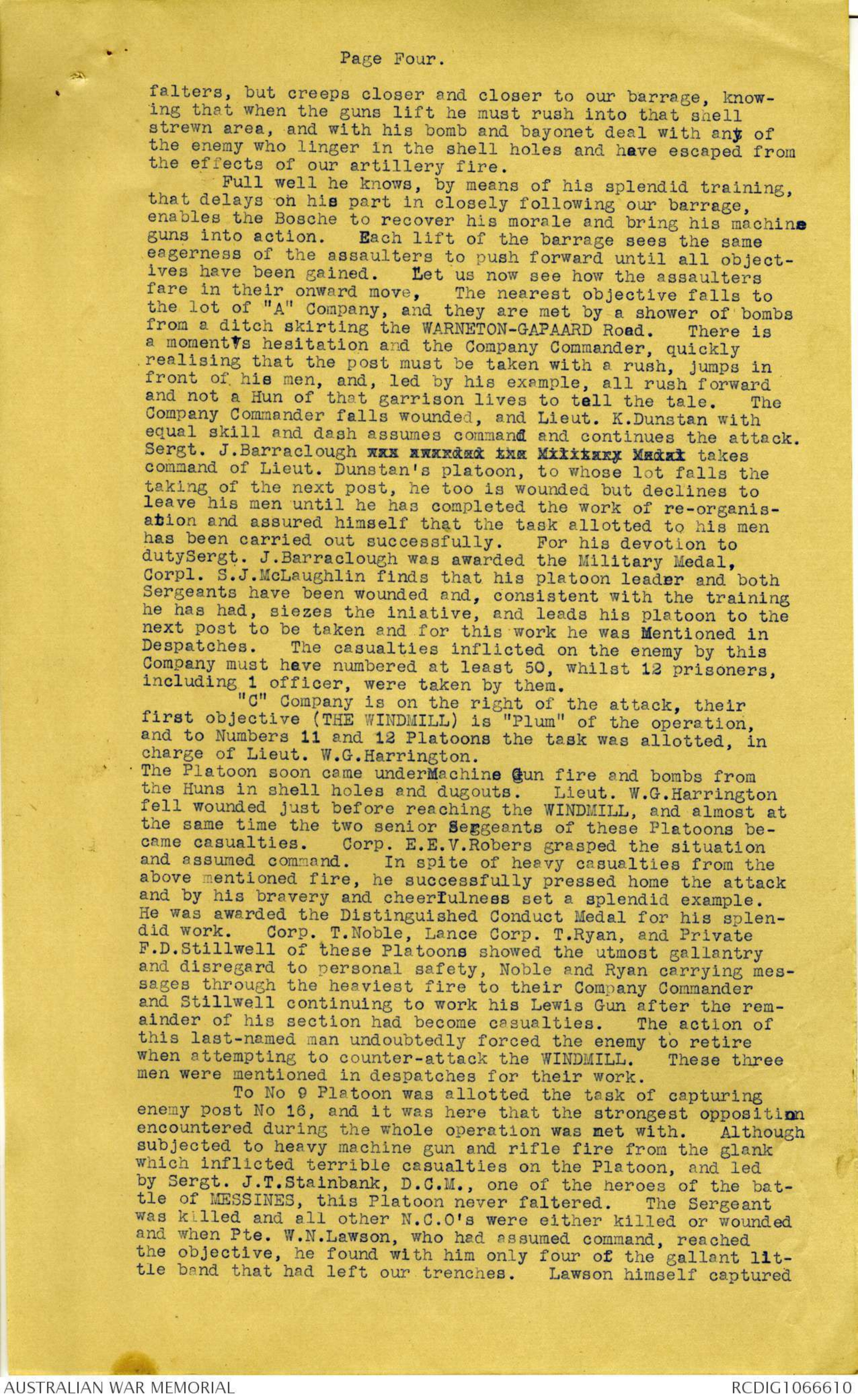
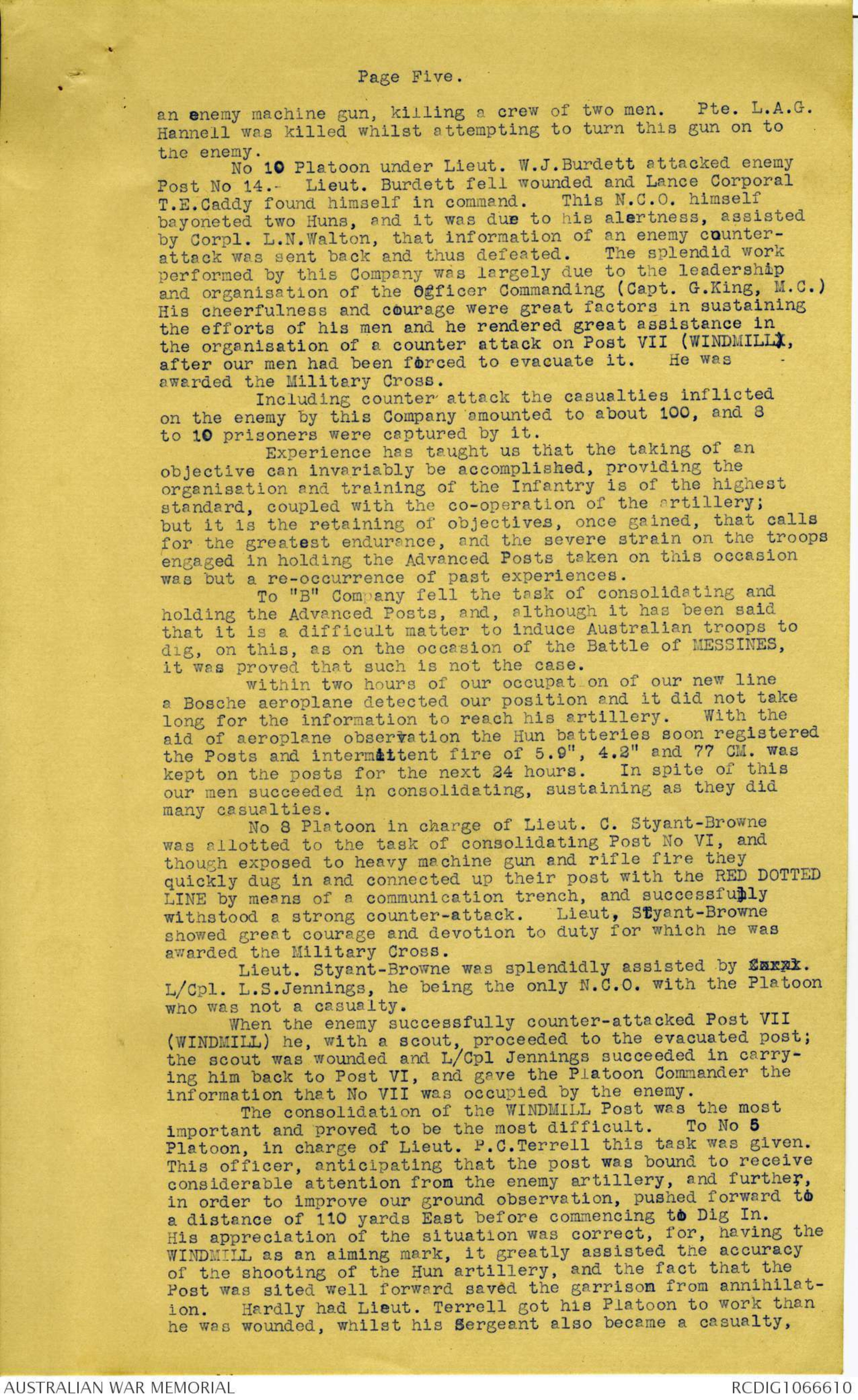
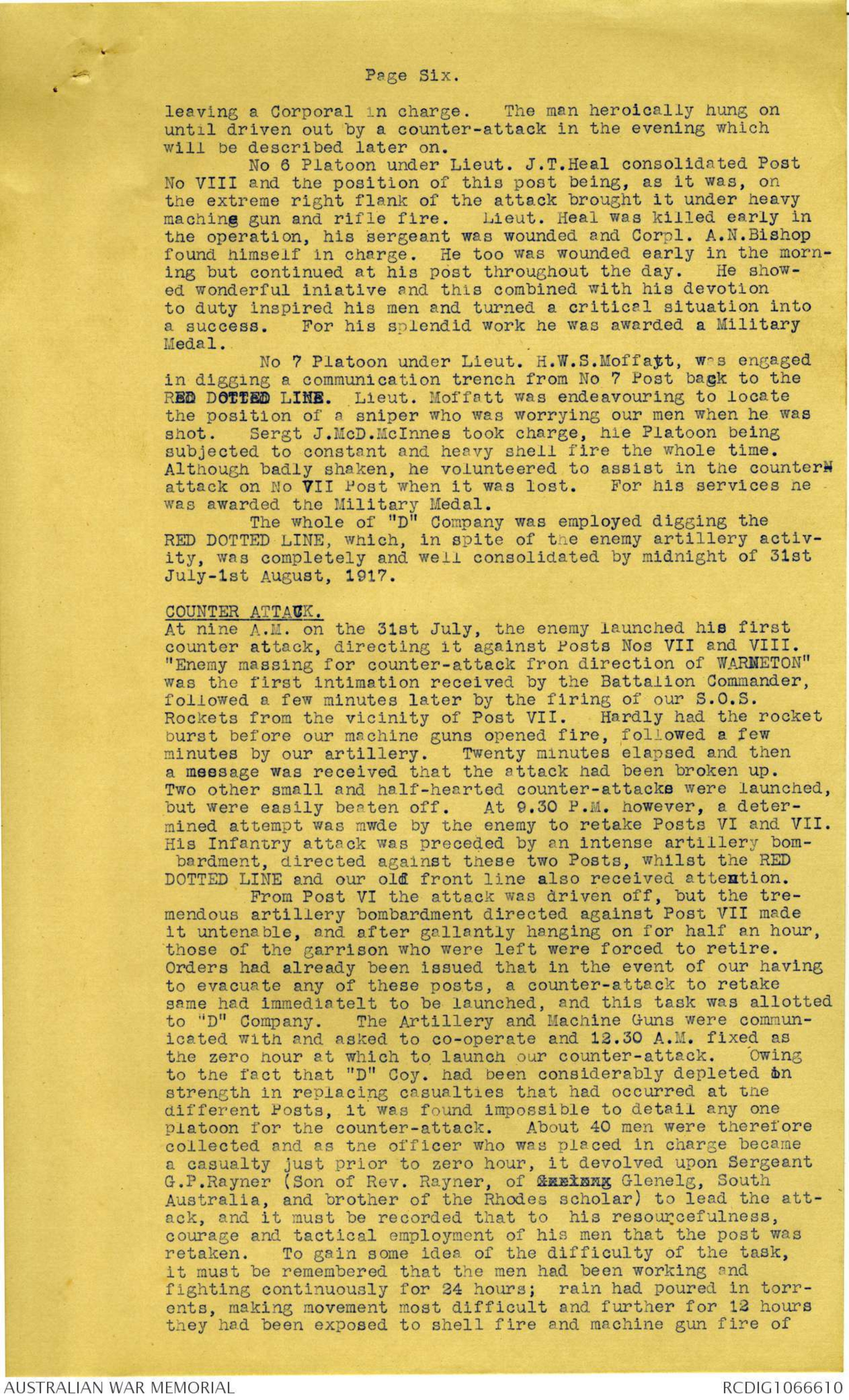
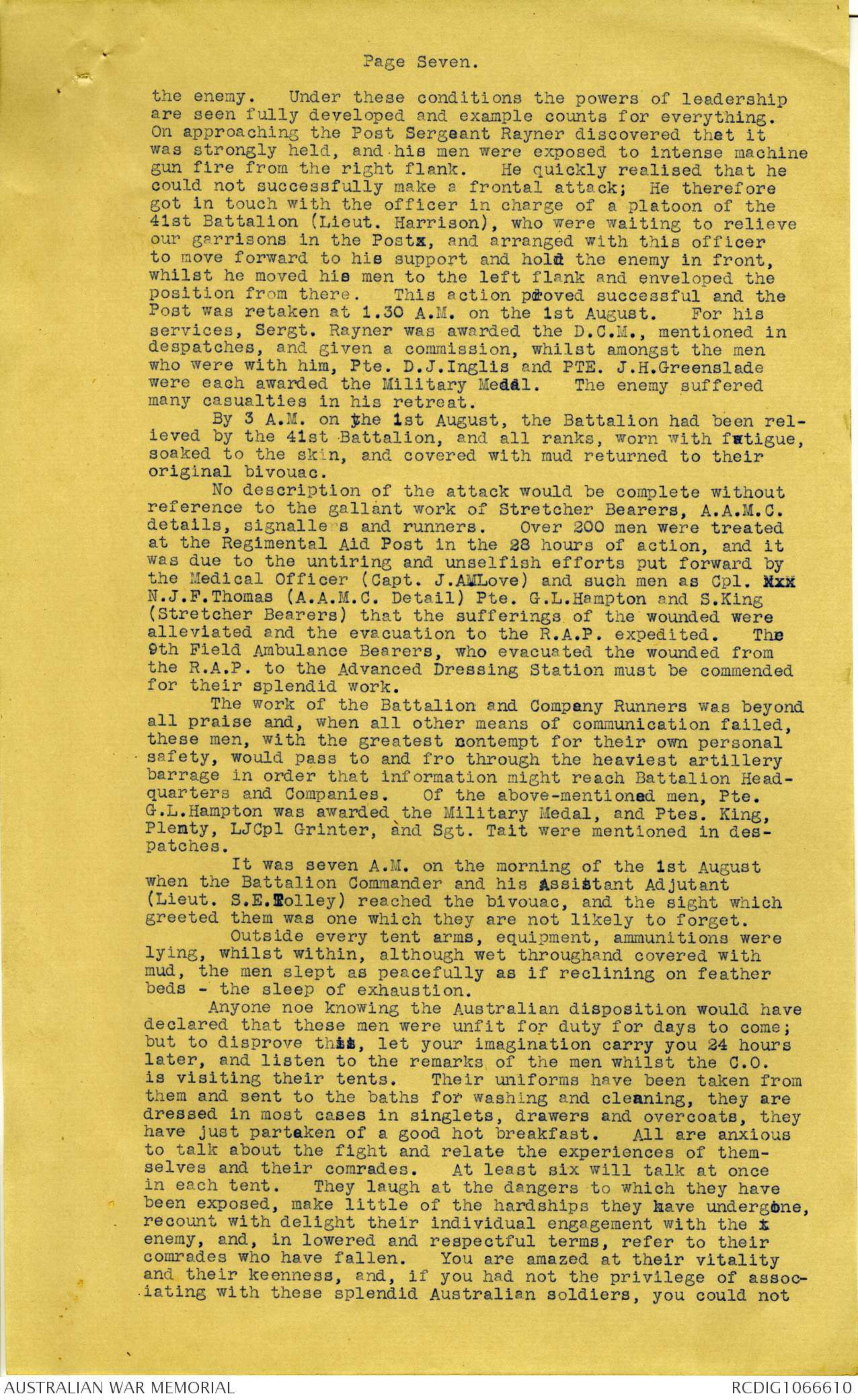
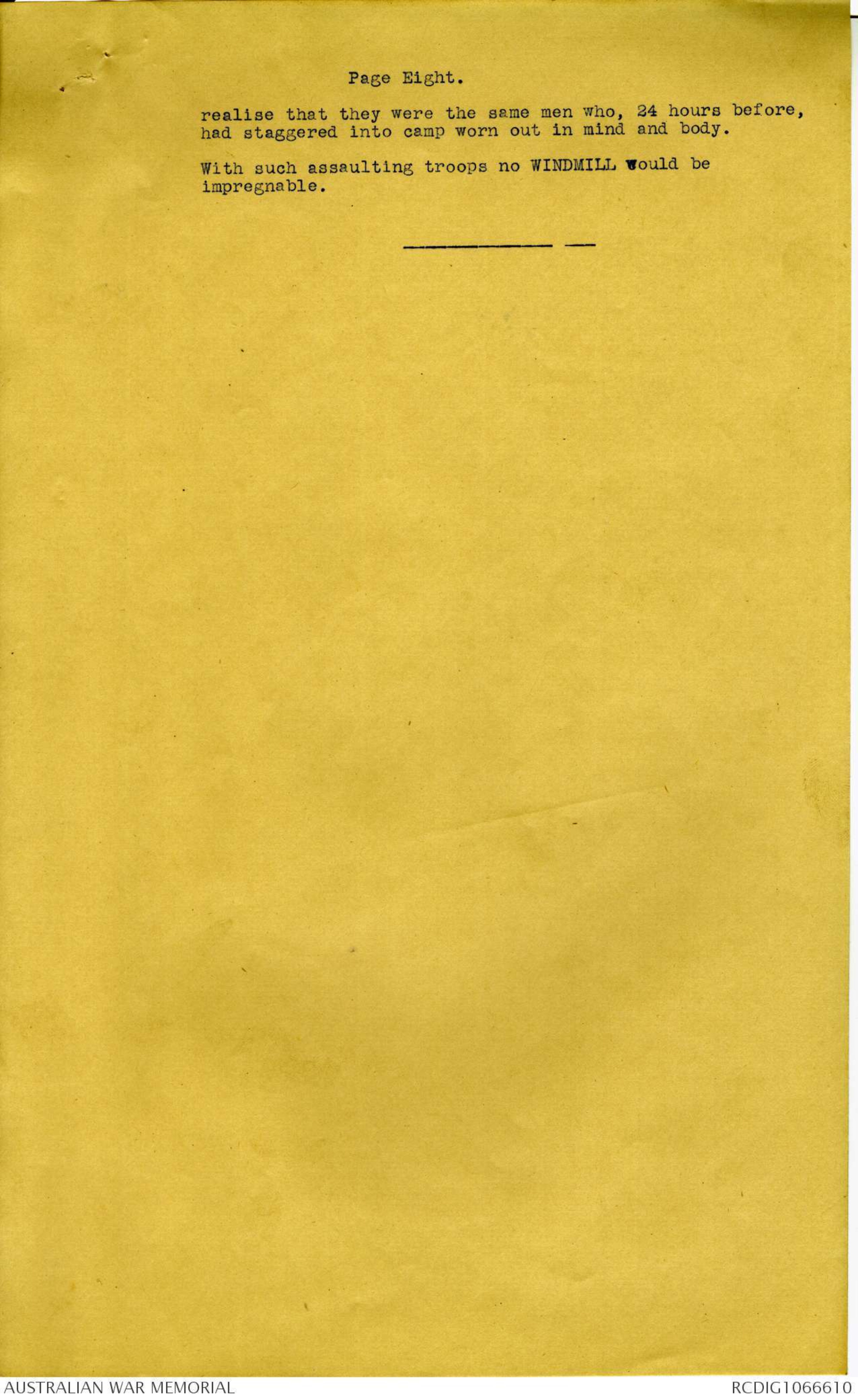
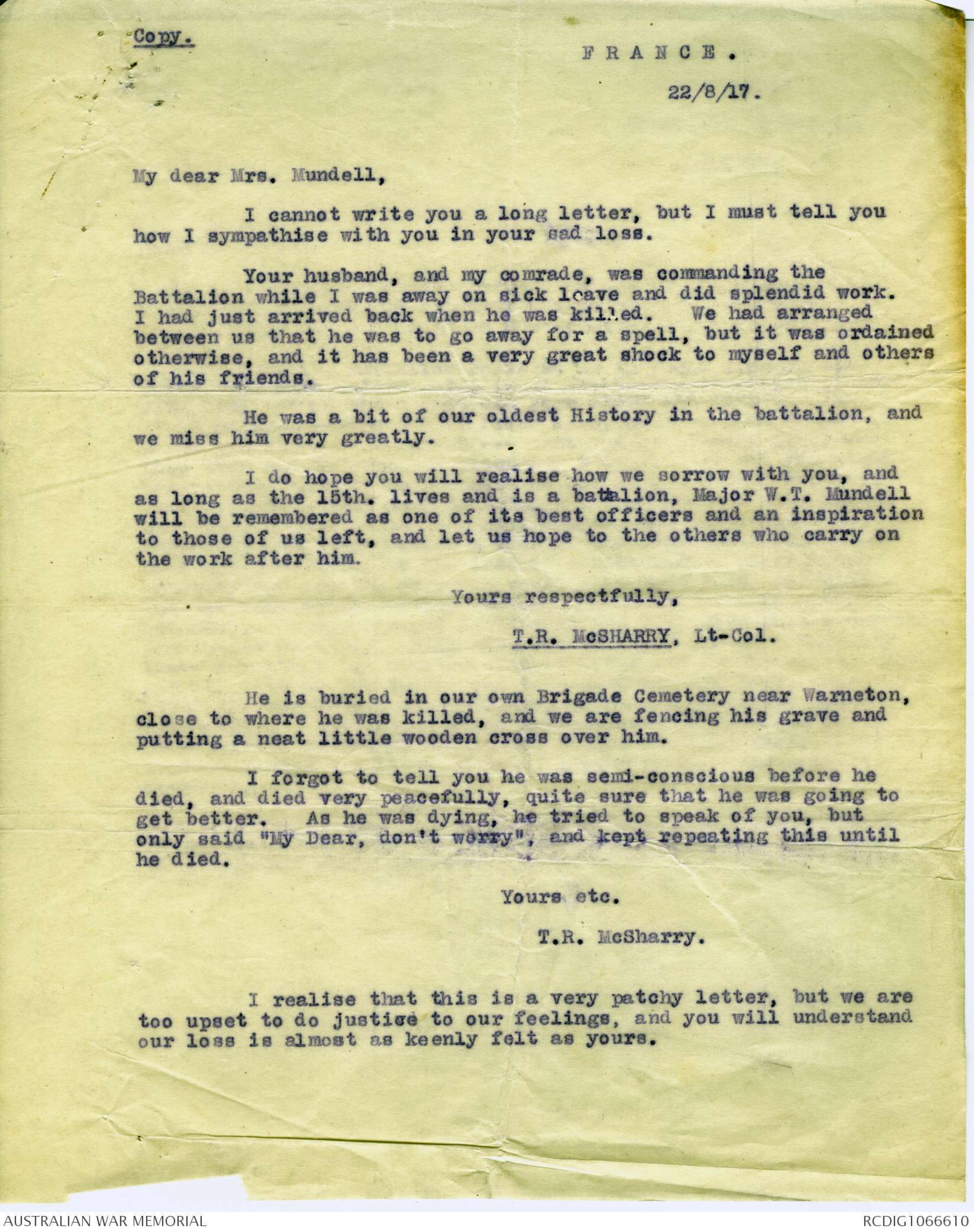
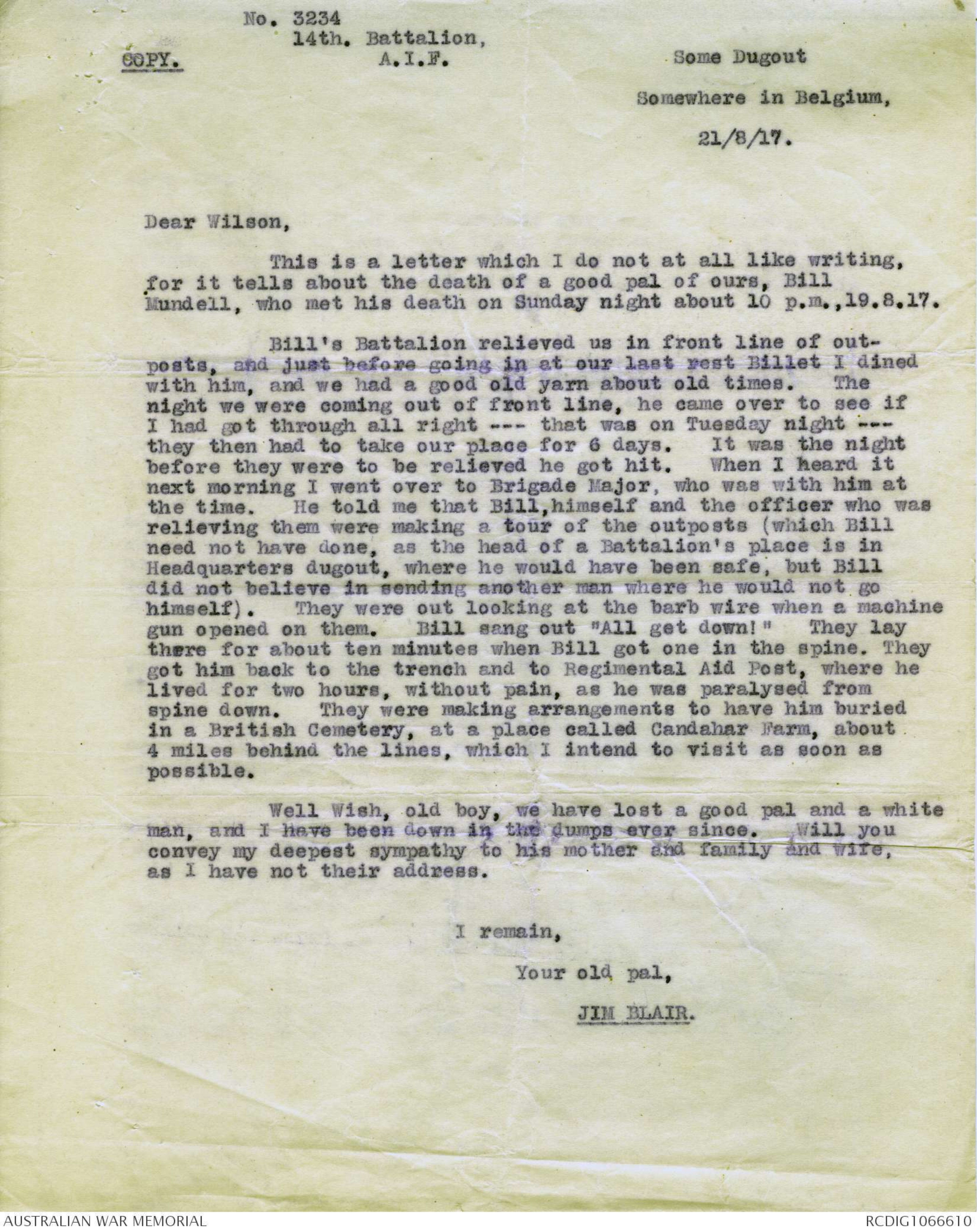
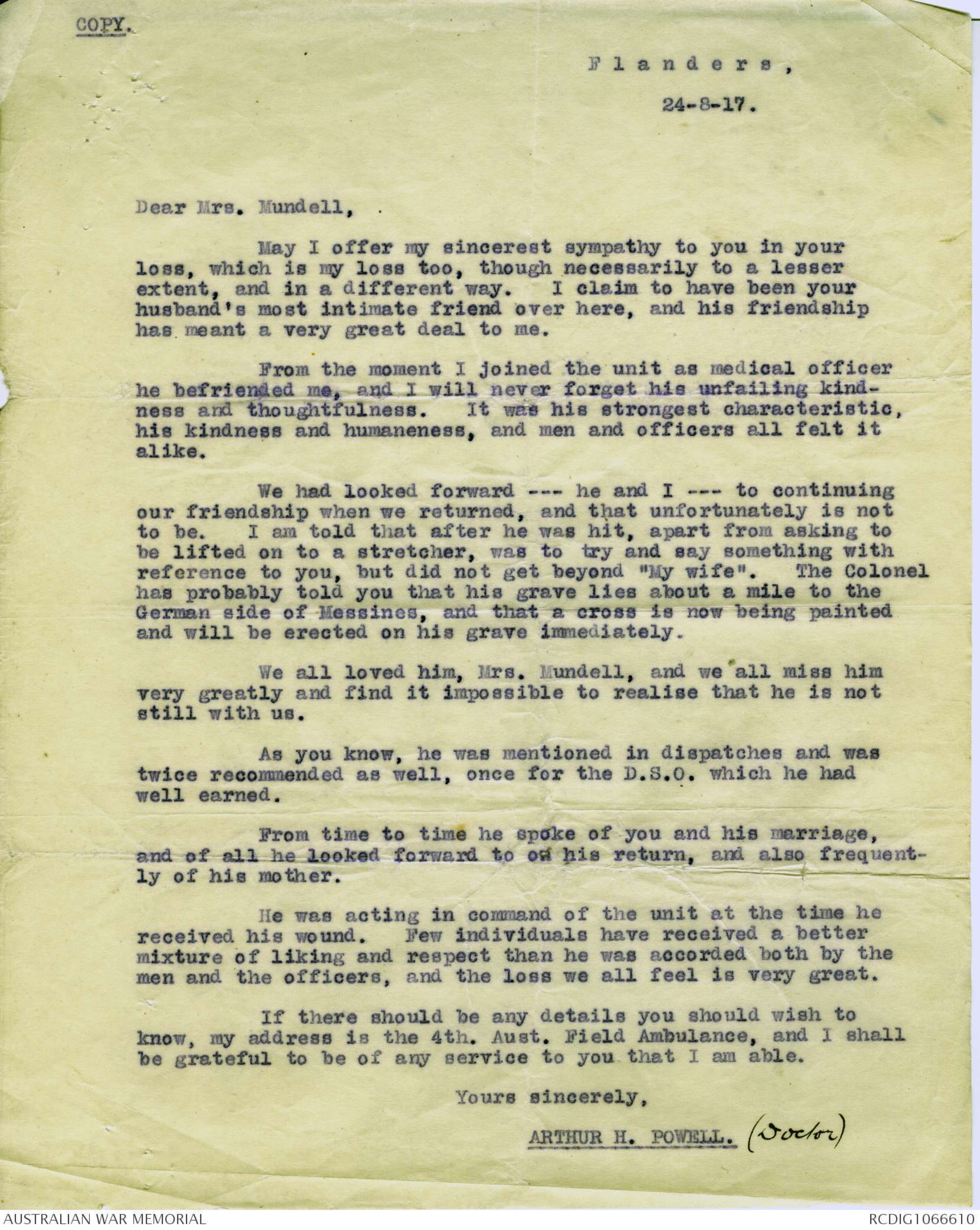
Page Two.
3 Advance Posts, known as Nos. VI, VII, and VIII., the first
being situated about 100 yards East of WARNETON-GAPAARD Road,
and 100 yards North of Post VII (WINDMILL), and the last,
150 yards South of the WINDMILL. In addition, it was proposed
to advance our line immediately West of xRTOx these posts,
a distance of 120 yards and this would be known as the RED
DOTTED LINE.
In order to deceive the enemy as to the exact extent of
our attack, and also with the idea of assisting our troops
in consolidating the posts and RED DOTTED LINE, the Platoons,
allotted to the Mopping Up of the enemy's Strong-points,
would be pushed on a distance of 200 yards, in the proximity
of the wirex, covering the enemy's WARNETON line of trenches.
These troops would withdraw to assist with the consolidation
of our Advanced Posts to cover our digging operations.
It might here be mentioned that apart from the object
of denying the enemy observation, the operation on this
portion of the front, was but a diversion, worked in conjunction
with the Northern Offensive, with the idea of leading
the enemy to believe that an attack on LILLE was projected,
and, judging by the number of troops and the large concentration
of Artillery opposed to us, the ruse was successful.
The distribution of the Battalion and the tasks alloted
to Companies for the attack were as under:-
To "A" Company (LIEUT. F.G Tucker) was given the task of
of Mopping Up three enemy Posts. "C" Company (Capt. G.King,
M.C) was to assault and Mop Up the remaining three posts,
including the WINDMILL. The establishing and consolidation
of our three Advanced Posts fell to the lot of "B" Company
(Lieut. E.J.Colliver) whilst "D" Company (Captain F.G.Sims)
was to dig the RED DOTTED LINE. After the withdrawal of the
assaulting (A and C Coys ) troops, they were to assist in the
consolidation of the new positions.
The attackers were to have the assistance, during the
attack, of various other arms of the service, whose duties
would be to co-operate in the following way:-
Three Brigades of Field Artillery and a number of
heavy guns were to pound the enemy's defences; the Field Guns
forming the barrage under which our men were to make the attack,
whilst the heavier calibre devoted their attention to
the neutralising olf of the enemy batteries. In addition
to this, it was proposed for the field guns to fire smoke
shells on to the enemy's WARNETON trenches, in order to cover
the withdrawal of our advanced troops, and, at the same time,
to lead the enemy to believe that under the cover of the
smoke, we were re-organising for a further advance. Stokes
Mortars and 2" were to co-operate by bombarding Strong-points
on the flanks of the attack, and they also were to use smoke
shells on the Southern of the advance in order to screen the
movements of our troops from observation from WARNETON. Forty
eight Machine guns were detailed to assist in the barrage and
these, with the Field Artillery, were to form the protective
barrage under which our troops would consolidate, and would
assist in breaking up probable enemy counter attacks. Gas
shells were to be used by our heavy artillery as neutralizing
fire on enemy batteries. Contact aeroplanes would also cooperate
to receive signals from the Infantry as to the progress of the attack.
By the night of 28th July, 1917, training had been completed
and all was ready for Zero day, equipment, and munitions
were ready for distribution, and, in this connection,
it might be mentioned that the 585 men who participated in
the attack, carried between them 15 tons weight of xxmunitions,
tools and consolidating material, all necessary for the successful
achievement of an attack under modern conditions.
Early on the afternoon of the 30th July, 1917, an officer
from Divisional Headquarters handed the Commander (Lieut-Col
C.P.Butler, D.S.O.) the fateful message, setting out
zero day and zero hour. Two hours sufficed to fully equip
all ranks. A good hot meal was forthcoming and about before
Page Three.
darkness set in (8.30 P.M.) 32 motor lorries reached the bivouac
to convey yhe troops on the first stage of what was to
prove a fatiguing and difficult approach march. In the vicinity
of the old British Front Line, overlooked by MESSINES,
the troops left the lorries and made their way, by means of
overland routes, broken with shellfire, and communication
trenches, in many places knee-deep with water (it had rained
heavily for three ^two days prior to the attack) to the "Jump Off"
trenches. The night was pitch dark and it required the most
careful supervision by Officers and N.C.O's and the hearty
co-operation of the rank and file, to ensure that touch was
not lost. All went xxx well until the Support Line was reached,
350 yards in rear of the Front Line; but here, as if in
anticipation of impending dangers to him, the enemy put an
intense artillery barrage over the route to be traversed,
and the trenches to be occupied by the attackers. A few
casualties had to be recorded here and progress was impaired
whilst Officers had to make their dispositions for reaching
their positions in the Front Line, by routes not affected by
the enemy barrage. Troops were timed to be in position to
Jump Off one hour before Zero, and it proves how trying were
the conditions under which the approach had to be effected,
when it is related that the last of our men reached the Jump
Off trench two minutes before the attack was to be launched.
One can imagine the feelings of a Brigadier and the Battalion
as they waited at their Headquarters unconscious of what had
happened, for the pre-arranged signal ("O.K."), which would
signify that troops were in position and all was well.
Our guns had opened, signifying that the hour for the
attack had come, and it was with feelings of more than relief
that the C.O. received the long waited for "O.K." three minutes
after Zero hour. Messages started to arrive with information
as to how the attack was progressing. "No 10 Post captured"
was the first received, and than, at intervals of a
few minutes, thei information that the WINDMILL and all posts,
except one on the extreme right, had been successfully Mopped
Up, came to hand. The O.C. "C" Coy. was the first to advise
that prisoners were being sent back. The enemy post on the
right (No 15) hung out the longest, owing to the activity of
enemy machine guns and snipers, and, in consequence of this,
the troops detailed to consolidate our Advance Post, No VIII,
were considerably hampered. The C.O., however, was soon
able to send the following message to the Brigadier, "All
objectives gained and consolidation proceeding". So much
for the operation as seen from Battalion Headquarters. Let
us now go forward with the assaulting troops. the first
streaks of dawn were appearing when the roar of our guns,
the screaming of the shells, and rattle of the machine guns
announced the opening of the attack. What a transformation!
Men who a few minutes before had struggled into their
position in the trench, tired and exhausted, wet through and
covered with mud, now, knowing that the hour for action had
arrived, all alert and eager for the fray. Instinctively
thay looked towards their leader and, as he leaps forward
over the parapet, with a cheery "Come on Boys", they follow
him as one man.
The enemy has not realised what has happened and is
probably saying to himself "This is only another of those mad
minutes the English have been in the habit of giving us during
the last week". One can imagine, as he realises that
this is no bluff how he spits and says, "Gott strafe England".
The scene that lies before our men as thay brush the
parapet is a landscape of flat country torn with shell holes.
About 150 yards ahead our shells are bursting, forming a
dense screen of white smoke which is illuminated by the flash
of bursting H.E., whilst above this wall of smoke the shrapnel
bursts, spreading its death-dealing pellets. Not a man fxlx
Page Four.
falters, but creeps closer and closer to our barrage, knowing
that when the guns lift he must rush into that shell
strewn area, and with his bomb and bayonet deal with any of
the enemy who linger in the shell holes and have escaped from
the effects of our artillery fire.
Full well he knows, by means of his splendid training,
that delays on his part in closely following our barrage
enables the Bosche to recover his morale and bring his machine
guns into action. Each lift of the barrage sees the same
eagerness of the assaulters to push forward until all objectives
have been gained. Let us now see how the assaulters
fare in their onward move, The nearest objective falls to
the lot of "A" Company, and they are met by a shower of bombs
from a ditch skirting the WARNETON-GAPAARD Road. There is
a moment's hesitation and the Company Commander, quickly
realising that the post must be taken with a rush, jumps in
front of his men, and, led by his example, all rush forward
and not a Hun of that garrison lives to tell the tale. The
Company Commander falls wounded, and Lieut. K.Dunstan with
equal skill and dash assumes command and continues the attack.
Sergt. J.Barraclough was awarded the Military Medal takes
command of Lieut. Dunstan's platoon, to whose lot falls the
taking of the next post, he too is wounded but declines to
leave his men until he has completed the work of re-organisation
and assured himself that the task allotted to his men
has been carried out successfully. For his devotion to
dutySergt. J.Barraclough was awarded the Military Medal,
Corpl. S.J.McLaughlin finds that his platoon leader and both
Sergeants have been wounded and, consistent with the training
he has had, siezes the iniative, and leads his platoon to the
next post to be taken and for this work he was Mentioned in
Despatches. The casualties inflected on the enemy by this
Company must have numbered at least 50, whilst 12 prisoners,
including 1 officer, were taken by them.
C" Company is on the right of the attack, their
first objective (THE WINDMILL) is "Plum" of the operation,
and to Numbers 11 and 12 Platoons the task was allotted, in
charge of Lieut. W.G.Harrington.
The Platoon soon came underMachine Gun fire and bombs from
the Huns in shell holes and dugouts. Lieut. W.G.Harrington
fell wounded just before reaching the WINDMILL, and almost at
the same time the two senior Sergeants of these Platoons became
casualties. Corp. E.E.V.Robers grasped the situation
and assumed command. In spite of heavy casualties from the
above mentioned fire, he successfully pressed home the attack
and by his bravery and cheerfulness set a splendid example.
He was awarded the Distinguished Conduct Medal for his splendid
work. Corp. T.Noble, Lance Corp. T.Ryan, and Private
F.D.Stillwell of these Platoons showed the utmost gallantry
and disregard to personal safety, Noble and Ryan carrying messages
through the heaviest fire to their Company Commander
and Stillwell continuing to work his Lewis Gun after the remainder
of his section had become casualties. The action of
this last-named man undoubtedly forced the enemy to retire
when attempting to counter-attack the WINDMILL. These three
men were mentioned in despatches for their work.
To No 9 Platoon was allotted the task of capturing
enemy post No 16, and it was here that the strongest opposition
encountered during the whole operation was net with. Although
subjected to heavy machine gun and rifle fire from the glank
which inflicted terrible casualties on the Platoon, and led
by Sergt. J.T.Stainbank, D.C.M., one of the heroes of the battle
of MESSINES, this Platoon never faltered. The Sergeant
was killed and all other N.C.O's were either killed or wounded
and when Pte. W.N.Lawson, who had assumed command, reached
the objective, he found with him only four of the gallant little
band that had left our trenches. Lawson himself captured
Page Five.
an enemy machine gun, killing a crew of two men. Pte. L.A.G.
Hannell was killed whilst attempting to turn this gun on to
the enemy.
No 10 Platoon under Lieut. W.J.Burdett attacked enemy
Post No 14.- Lieut. Burdett fell wounded and Lance Corporal
T.E.Caddy found himself in command. This N.C.O himself
bayoneted two Huns, and it was due to his alertness, assisted
by Corpl. L.N.Walton, that information of an enemy counter-attack
was sent back and thus defeated. The splendid work
performed by this Company was largely due to the leadership
and organisation of the Officer Commanding (Capt. G.King, M.C.)
His cheerfulness and courage were great factors in sustaining
the efforts of his men and he rendered great assistance in
the organisation of a counter attack on Post VII (WINDMILL),
after our men had been forced to evacuate it. He was
awarded the Military Cross.
Including counter attack the casualties inflicted
on the enemy by this Company amounted to about 100, and 8
to 10 prisoners were captured by it.
Experience has taught us that the taking of an
objective can invariably be accomplished, providing the
organisation and training of the Infantry is of the highest
standard, coupled with the co-operation of the artillery;
but it is the retaining of objectives, once gained, that calls
for the greatest endurance, and the severe strain on the troops
engaged in holding the Advanced Posts taken on this occasion
was but a re-occurrence of past experiences.
To "B" Company fell the task of consolidating and
holding the Advanced Posts, and, although it has been said
that it is a difficult matter to induce Australian troops to
dig, on this, as on the occasion of the Battle of MESSINES,
it was proved that such is not the case.
within two hours of our occupation of our new line
a Bosche aeroplane detected our position and it did not take
long for the information to reach his artillery. With the
aid of aeroplane observation the Hun batteries soon registered
the Posts and intermittent fire of 5.9", 4.2" and 77 CM. was
kept on the posts for the next 24 hours. In spite of this
our men succeeded in consolidating, sustaining as they did
many casualties.
No 8 Platoon in charge of Lieut. C. Styant-Browne
was allotted to the task of consolidating Post No VI, and
though exposed to heavy machine gun and rifle fire they
quickly dug in and connected up their post with the RED DOTTED
LINE by means of a communication trench, and successfully
withstood a strong counter-attack. Lieut, Styant-Browne
showed great courage and devotion to duty for which he was
awarded the Military Cross.
Lieut. Styant-Browne was splendidly assisted by Corpl.
L/Cpl. L.S.Jennings, he being the only N.C.O. with the Platoon
who was not a casualty.
When the enemy successfully counter-attacked Post VII
(WINDMILL) he, with a scout, proceeded to the evacuated post;
the scout was wounded and L/Cpl Jennings succeeded in carrying
him back to Post VI, and gave the Platoon Commander the
information that No VII was occupied by the enemy.
The consolidation of the WINDMILL Post was the most
important and proved to be the most difficult. To No 5
Platoon, in charge of Lieut. P.C.Terrell this task was given.
This officer, anticipating that the post was bound to receive
considerable attention from the enemy artillery, and further,
in order to improve our ground observation, pushed forward to
a distance of 110 yards East before commencing to Dig In.
His appreciation of the situation was correct, for, having the
WINDMILL as an aiming mark, it greatly assisted the accuracy
of the shooting of the Hun artillery, and the fact that the
Post was sited well forward saved the garrison from annihilation.
Hardly had Lieut. Terrell got his Platoon to work than
he was wounded, whilst his Sergeant also became a casualty,
Page Six.
leaving a Corporal in charge. The man heroically hung on
until driven out by a counter-attack in the evening which
will be described later on.
No 6 Platoon under Lieut. J.T.Heal consolidated Post
No VIII and the position of this post being, as it was, on
the extreme right flank of the attack brought it under heavy
machine gun and rifle fire. Lieut. Heal was killed early in
the operation, his sergeant was wounded and Corpl. A.N.Bishop
found himself in charge. He too was wounded early in the morning
but continued at his post throughout the day. He showed
wonderful iniative and this combined with his devotion
to duty inspired his men and turned a critical situation into
a success. For his splendid work he was awarded a Military
Medal.
No 7 Platoon under Lieut. H.W.S.Moffatt, was engaged
in digging a communication trench from No 7 Post back to the
RED DOTTED LINE. Lieut. Moffatt was endeavouring to locate
the position of a sniper who was worrying our men when he was
shot. Sergt J.McD.McInnes took charge, hie Platoon being
subjected to constant and heavy shell fire the whole time.
Although badly shaken, he volunteered to assist in the counter-attack
on No VII Post when it was lost. For his services he
was awarded the Military Medal.
The whole of "D" Company was employed digging the
RED DOTTED LINE, which, in spite of the enemy artillery activity,
was completely and well consolidated by midnight of 31st
July-1st August, 1917.
COUNTER ATTACK.
At nine A.M. on the 31st July, the enemy launched his first
counter attack, directing it against Posts Nos VII and VIII.
"Enemy massing for counter-attack fron direction of WARNETON
was the first intimation received by the Battalion Commander,
followed a few minutes later by the firing of our S.O.S.
Rockets from the vicinity of Post VII. Hardly had the rocket
burst before our machine guns opened fire, followed a few
minutes by our artillery. Twenty minutes elapsed and then
a message was received that the attack had been broken up.
Two other small and half-hearted counter-attacks were launched,
but were easily beaten off. At 9.30 P.M. however, a determined
attempt was mwde by the enemy to retake Posts VI and VII.
His Infantry attack was preceded by an intense artillery bombardment,
directed against these two Posts, whilst the RED
DOTTED LINE and our old front line also received attention.
From Post VI the attack was driven off, but the tremendous
artillery bombardment directed against Post VII made
it untenable, and after gallantly hanging on for half an hour,
those of the garrison who were left were forced to retire.
Orders had already been issued that in the event of our having
to evacuate any of these posts, a counter-attack to retake
same had immediatelt to be launched, and this task was allotted
to "D" Company. The Artillery and Machine Guns were communicated
with and asked to co-operate and 12.30 A.M. fixed as
the zero hour at which to launch our counter-attack. Owing
to the fact that 'D" Coy. had been considerably depleted on
strength in replacing casualties that had occurred at the
different Posts, it was found impossible to detail any one
platoon for the counter-attack. About 40 men were therefore
collected and as the officer who was placed in charge became
a casualty just prior to zero hour, it devolved upon Sergeant
G.P.Rayner (Son of Rev. Rayner, of Geelong Glenelg, South
Australia, and brother of the Rhodes scholar) to lead the attack,
and it must be recorded that to his resourcefulness,
courage and tactical employment of his men that the post was
retaken. To gain some idea of the difficulty of the task,
it must be remembered that the men had been working and
fighting continuously for 24 hours; rain had poured in torrents,
making movement most difficult and further for 12 hours
they had been exposed to shell fire and machine gun fire of
Page Seven.
the enemy. Under these conditions the powers of leadership
are seen fully developed and example counts for everything.
On approaching the Post Sergeant Rayner discovered that it
was strongly held, and his men were exposed to intense machine
gun fire from the right flank. He quickly realised that he
could not successfully make a frontal attack; He therefore
got in touch with the officer in charge of a platoon of the
41st Battalion (Lieut. Harrison), who were waiting to relieve
our garrisons in the Postx, and arranged with this officer
to move forward to his support and hold the enemy in front,
whilst he moved his men to the left flank and enveloped the
position from there. This action proved successful and the
Post was retaken at 1.30 A.M. on the 1st August. For his
services, Sergt. Rayner was awarded the D.C.M., mentioned in
despatches, and given a commission, whilst amongst the men
who were with him, Pte. D.J.Inglis and PTE. J.H.Greenslade
were each awarded the Military Medal. The enemy suffered
many casualties in his retreat.
By 3 A.M. on the 1st August, the Battalion had been relieved
by the 41st Battalion, and all ranks, worn with fatigue,
soaked to the skin, and covered with mud returned to their
original bivouac.
No description of the attack would be complete without
reference to the gallant work of Stretcher Bearers, A.A.M.C.
details, signallers and runners. Over 200 men were treated
at the Regimental Aid Post in the 28 hours of action, and it
was due to the untiring and unselfish efforts put forward by
the Medical Officer (Capt. J.AMLove) and such men as Cpl. xxx
N.J.F.Thomas (A.A.M.C. Detail) Pte. G.L.Hampton and S.King
(Stretcher Bearers) that the sufferings of the wounded were
alleviated and the evacuation to the R.A.P. expedited. The
9th Field Ambulance Bearers, who evacuated the wounded from
the R.A.P. to the Advanced Dressing Station must be commended
for their splendid work.
The work of the Battalion and Company Runners was beyond
all praise and, when all other means of communication failed,
these men, with the greatest contempt for their own personal
safety, would pass to and fro through the heaviest artillery
barrage in order that information might reach Battalion Headquarters
and Companies. Of the above-mentioned men, Pte.
G.L.Hampton was awarded the Military Medal, and Ptes. King,
Plenty, LJCpl Grinter, and Sgt. Tait were mentioned in despatches.
It was seven A.M. on the morning of the 1st August
when the Battalion Commander and his Assistant Adjutant
(Lieut. S.E.Tolley) reached the bivouac, and the sight which
greeted them was one which they are not likely to forget.
Outside every tent arms, equipment, ammunitions were
lying whilst within, although wet throughand covered with
mud, the men slept as peacefully as if reclining on feather
beds - the sleep of exhaustion.
Anyone noe knowing the Australian disposition would have
declared that these men were unfit for duty for days to come;
but to disprove this, let your imagination carry you 24 hours
later, and listen to the remarks of the men whilst the C.O.
is visiting their tents. Their uniforms have been taken from
them and sent to the baths for washing and cleaning, they are
dressed in most cases in singlets, drawers and overcoats, they
have just partaken of a good hot breakfast. All are anxious
to talk about the fight and relate the experiences of themselves
selves and their comrades. At least six will talk at once
in each tent. They laugh at the dangers to which they have
been exposed, make little of the hardships they have undergone,
recount with delight their individual engagement with the t
enemy, and, in lowered and respectful terms, refer to their
comrades who have fallen. You are amazed at their vitality
and their keenness, and, if you had not the privilege of associating
with these splendid Australian soldiers, you could not
Page Eight.
realise that they were the same men who, 24 hours before,
had staggered into camp worn out in mind and body.
With such assaulting troops no WINDMILL would be
impregnable.
Copy.
FRANCE.
22/8/17.
My dear Mrs. Mundell,
I cannot write you a long letter, but I must tell you
how I sympathise with you in your sad loss.
Your husband, and my comrade, was commanding the
Battalion while I was away on sick leave and did splendid work.
I had just arrived back when he was killed. We had arranged
between us that he was to go away for a spell, but it was ordained
otherwise, and it has been a very great shock to myself and others
of his friends.
He was a bit of our oldest History in the battalion, and
we miss him very greatly.
I do hope you will realise how we sorrow with you, and
as long as the 15th, lives and is a battalion, Major W.T. Mundell
will be remembered as one of its best officers and an inspiration
to those of us left, and let us hope to the others who carry on
the work after him.
Yours respectfully,
T.R. McSHARRY, Lt-Col.
He is buried in our own Brigade Cemetery near Warneton,
close to where he was killed, and we are fencing his grave and
putting a neat little wooden cross over him.
I forgot to tell you he was semi-conscious before he
died, and died very peacefully, quite sure that he was going to
get better. As he was dying, he tried to speak of you, but
only said "My Dear, don't worry", and kept repeating this until
he died.
Yours etc.
T.R. McSharry.
I realise that this is a very patchy letter, but we are
too upset to do justice to our feelings, and you will understand
our loss is almost as keenly felt as yours.
COPY.
No. 3234
14th. Battalion,
A.I.F.
Some Dugout
Somewhere in Belgium,
21/8/17.
Dear Wilson,
This is a letter which I do not at all like writing,
for it tells about the death of a good pal of ours, Bill
Mundell, who met his death on Sunday night about 10 p.m.,19.8.17.
Bill's Battalion relieved us in front line of outposts,
and just before going in at our last rest Billet I dined
with him, and we had a good old yarn about old times. The
night we were coming out of front line, he came over to see if
I had got through all right --- that was on Tuesday night ---
they then had to take our place for 6 days. It was the night
before they were to be relieved he got hit. When I heard it
next morning I went over to Brigade Major, who was with him at
the time. He told me that Bill, himself and the officer who was
relieving them were making a tour of the outposts (which Bill
need not have done, as the head of a Battalion's place is in
Headquarters dugout, where he would have been safe, but Bill
did not believe in sending another man where he would not go
himself). They were out looking at the barb wire when a machine
gun opened on them. Bill sang out "All get down!" They lay
there for about ten minutes when Bill got one in the spine. They
got him back to the trench and to Regimental Aid Post, where he
lived for two hours, without pain, as he was paralysed from
spine down. They were making arrangements to have him buried
in a British Cemetery, at a place called Candahar Farm, about.
4 miles behind the lines, which I intend to visit as soon as
possible.
Well Wish, old boy, we have lost a good pal and a white
man, and I have been down in the dumps ever since. Will you
convey my deepest sympathy to his mother and family and wife,
as I have not their address.
I remain,
Your old pal,
JIM BLAIR
COPY.
Flanders,
24-8-17.
Dear Mrs. Mundell,
May I offer my sincerest sympathy to you in your
loss, which is my loss too, though necessarily to a lesser
extent, and in a different way. I claim to have been your
husband's most intimate friend over here, and his friendship
has meant a very great deal to me.
From the moment I joined the unit as medical officer
he befriended me, and I will never forget his unfailing kindness
and thoughtfulness. It was his strongest characteristic,
his kindness and humaneness, and men and officers all felt it
alike.
We had looked forward --- he and I --- to continuing
our friendship when we returned, and that unfortunately is not
to be. I am told that after he was hit, apart from asking to
to be lifted on to a stretcher, was to try and say something with
reference to you, but did not get beyond "My wife". The Colonel
has probably told you that his grave lies about a mile to the
German side of Messines, and that a cross is now being painted
and will be erected on his grave immediately.
We all loved him, Mrs. Mundell, and we all miss him
very greatly and find it impossible to realise that he is not
still with us.
As you know, he was mentioned in dispatches and was
twice recommended as well, once for the D.S.O. which he had
well earned.
From time to time he spoke of you and his marriage
and of all he looked forward to on his return, and also frequently
of his mother.
He was acting in command of the unit at the time he
received his wound. Few individuals have received a better
mixture of liking and respect than he was accorded both by the
men and the officers, and the loss we all feel is very great.
If there should be any details you should wish to
know, my address is the 4th. Aust. Field Ambulance, and I shall
be grateful to be of any service to you that I am able.
Yours sincerely,
ARTHUR H. POWELL. (Doctor)
 Sandy Mudie
Sandy MudieThis transcription item is now locked to you for editing. To release the lock either Save your changes or Cancel.
This lock will be automatically released after 60 minutes of inactivity.